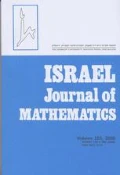Abstract
Letf (X, t)εℚ[X, t] be an irreducible polynomial. Hilbert’s irreducibility theorem asserts that there are infinitely manyt 0εℤ such thatf (X, t 0) is still irreducible. We say thatf (X, t) isgeneral if the Galois group off (X, t) over ℚ(t) is the symmetric group in its natural action. We show that if the degree off with respect toX is a prime ≠ 5 or iff is general of degree ≠ 5, thenf (X, t 0) is irreducible for all but finitely manyt 0εℤ unless the curve given byf (X, t)=0 has infinitely many points (x 0,t 0) withx 0εℚ,t 0εℤ. The proof makes use of Siegel’s theorem about integral points on algebraic curves, and classical results about finite groups, going back to Burnside, Schur, Wielandt, and others.
Similar content being viewed by others
References
Y. Bilu,A note on universal Hilbert sets, Journal für die reine und angewandte Mathematik479 (1996), 195–203.
P. Dèbes and M. Fried,Integral specialization of families of rational functions, preprint.
J. D. Dixon and B. Mortimer,Permutation Groups, Springer-Verlag, New York, 1996.
P. Dèbes and U. Zannier,Universal Hilbert subsets, Mathematical Proceedings of the Cambridge Philosophical Society124 (1998), 127–134.
M. Fried,On Hilbert’s irreducibility theorem, Journal of Number Theory6 (1974), 211–231.
M. Fried,Review of Serre’s ‘Topics in Galois Theory’, Bulletin of the American Mathematical Society (New Series)30(1) (1994), 124–135.
M. Fried,Extension of constants, rigidity, and the Chowla-Zassenhaus conjecture, Finite Fields and their Application1 (1995), 326–359.
D. Gorenstein,Finite Groups, Harper and Row, New York-Evanston-London, 1968.
B. Huppert and N. Blackburn,Finite Groups III, Springer-Verlag, Berlin-Heidelberg, 1982.
B. Huppert,Endliche Gruppen I, Springer-Verlag, Berlin-Heidelberg, 1967.
S. Lang,Fundamentals of Diophantine Geometry, Springer-Verlag, New York, 1983.
P. Müller,Reducibility behavior of polynomials with varying coefficients, Israel Journal of Mathematics94 (1996), 59–91.
P. M. Neumann,Transitive permutation groups of prime degree, Journal of the London Mathematical Society (2)5 (1972), 202–208.
J.-P. Serre,Topics in Galois Theory, Jones and Bartlett, Boston, 1992.
K. Shih,On the construction of Galois extensions of function fields and number fields, Mathematische Annalen207 (1974), 99–120.
C. L. Siegel,Über einige Anwendungen diophantischer Approximationen, Abhandlungen der Preussischen Akademie der Wissenschaften1 (1929), 41–69 (= Gesammelte Abhandlungen I, 209–266).
H. Völklein,Groups as Galois Groups—An Introduction, Cambridge University Press, New York, 1996.
H. Wielandt,Finite Permutation Groups, Academic Press, New York-London, 1964.
U. Zannier,Note on dense Hilbert sets, Comptes Rendus de l’Académie des Sciences, Paris, Série I Mathématiques322 (1996), 703–706.
Author information
Authors and Affiliations
Corresponding author
Additional information
Supported by the DFG.
Rights and permissions
About this article
Cite this article
Müller, P. Hilbert’s irreducibility theorem for prime degree and general polynomials. Isr. J. Math. 109, 319–337 (1999). https://doi.org/10.1007/BF02775041
Received:
Revised:
Issue Date:
DOI: https://doi.org/10.1007/BF02775041


